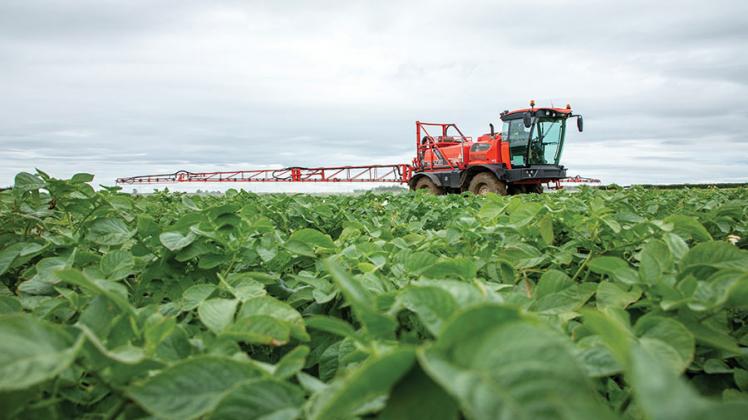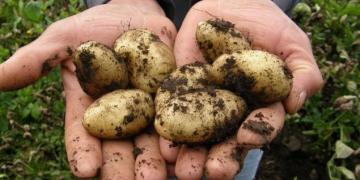Gran Bretaña: What is GB Potatoes and why should farmers join?
GB Potatoes, the new industry body which aims to represent the views of the potato sector and champion British produce, is calling for more growers and processors to join the not-for-profit organisation.

After the demise of the AHDB potato levy board, which left the industry without representation, GB Potatoes offers a unique opportunity to unite the potato sector with a meaningful and focussed voice.
See also: Revystar approved for use in sugar beet this season
Its key objective is to engage with growers, government, media, researchers and other supply chain stakeholders to secure a viable future for UK potato production, explains Mark Taylor, chairman of the initiative.
He notes the potato industry is going through severely challenging times, which is why membership is priced at a fraction of the previous levy.
“We’ve deliberately pitched membership low at just 22% of the mandatory AHDB levy to encourage signup and get the support we need to get us going,” he says.
Membership fees are priced at £10/ha for growers and 10p/t for packers and processors. Companies associated with the sector are encouraged to join as associate members..
GB Potatoes has set its target membership at 50% of the UK potato area with a further 50% of the tonnage of processors and packers signed up.
Mark talks us through the recent and future plans of GB Potatoes.
Lobby government
One of the initiative’s priorities is to lobby government and influence regulatory policy, as the voice for the potato sector when dealing with policymakers.
The organisation will be a single point of contact for government, aiming to develop a robust and meaningful UK food strategy that recognises the importance of British potatoes.
“By engaging with Defra, this can better inform policy-making and raise awareness on the impacts of diminishing productivity and self-sufficiency specific to the potato crop,” he says.
“Each part of the supply chain needs to be properly rewarded for the risk it takes,” continues Mark, who is already in contact with Defra Minister, Mark Spencer to organise a sector meeting.
Champion potatoes
GB Potatoes aims to champion the UK potato industry at every opportunity. “The UK potato sector is worth £4bn at retail level and we want potatoes to be the carbohydrate of first choice, with UK consumers eating UK potatoes.”
To this end, the initiative looks to champion:
Nutrition Potatoes are rich in carbohydrates, vitamin C, B1, B6, Iron and potassium. They are low in fat and calories, with just 78kcal per 100g
Media engagement To promote a positive potato profile and sharing essential messages during periods of crisis to get voices heard
Healthy rotations and rural economies Buying British potatoes supports rural economies, driving demand and better prices for growers. Potatoes are also effective break-crops, widening arable rotations to reduce build-up of pests and disease
Lower environmental impact Compared to other key foodstuffs such as rice and pasta, potatoes have lower water usage and greenhouse gas emissions (GHG). Per portion rice has three times higher and pasta double the amount of relative GHG emissions.
Convene the National PCN Forum
The organisation is facilitating an industry-wide forum to tackle the growing threat of the potato cyst nematode (PCN).
This pest represents the most serious threat to UK potato production and affects all sectors.
“A “joined-up” solution will take us forward and GB Potatoes will provide this platform.
“Our next plan is to establish an industry steering group with breeders, growers, researchers and others in the supply chain to get a priority consensus,” Mark says.
Support the Fight against blight programme
Supporting the Fight against blight campaign to ensure essential blight strain monitoring and future control strategies continues is another important factor.
“Blight is ever-evolving, which is why carrying out research previously funded by the AHDB is so important.”
Last year this was funded by the Scottish government and this year a consortium of companies have funded it, but its long-term future remains less secure.
As GB Potatoes works on a significantly smaller budget compared to the AHDB, it won’t be directly commissioning large research and development projects, but will co-ordinate industry experts to drive change within the industry.
Aim to lift the seed ‘trade ban’
GB Potatoes will continue to lobby to end the potato seed trade ban between the UK and EU.
Prior to Brexit, about 25,000t of potatoes were traded to and from Europe, but this has since been halted.
The UK import restrictions primarily affect English ware growers, while the export ban primarily affects Scottish seed growers.
Two-way trade of different varieties aimed at specific markets is essential to exploit optimum genetics, resistance and tolerance traits.
Breeding will play a big part in future integrated pest management approaches, which is why lifting the seed trade ban is so important, says Mr Taylor.
Grower thoughts: Tom Stevenson, Essex
Essex-based potato grower Tom Stevenson joined GB Potatoes last September when the organisation launched.
He is a strong believer that the UK potato industry requires an umbrella initiative to provide a voice for the entire sector.
“If we start carving up the industry into smaller sub-sections with lots of smaller organisations we can lose critical mass and the vital voice for growers,” he says.
He adds that growers are not aware of the many behind the scene factors which affect the supply chain, such as lobbying with government on a range of regulations.
“GB Potatoes can scout out these issues and tackle them before we even realise,” he says.
“There is some reluctance to join, with some growers saying: ‘We will see how it gets on, before we join’.
“But if everyone sits on the fence the initiative will get nowhere. It needs the initial funding to get it off the ground.”
Mr Stevenson notes the membership cost/ha is less than the cheapest blight spray. “That’s a good insurance price to pay to keep our industry in good stead,” he concludes.
Fuente: https://www.fwi.co.uk/arable/potatoes/what-is-gb-potatoes-and-why-should-farmers-join




